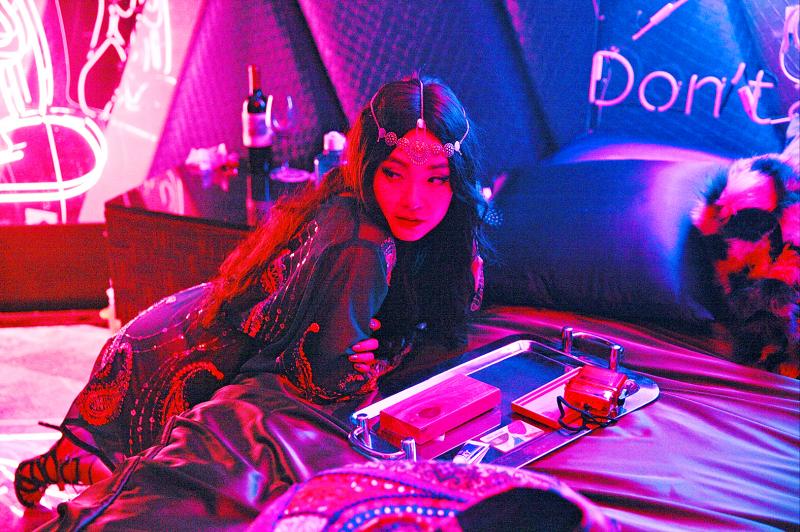If you think Leaving Virginia is going to be Taiwan’s modern-day version of American Pie, leave after the first 15 minutes. It starts that way, an ode to those hormone-crazed teenage years as Big D (Isaac Yang, 楊懿軒) tries to lose his virginity on his 18th birthday but his Christian girlfriend rejects his advances and storms off. His best friend Zulie (Ng Siu Hin, 吳肇軒), convinces Big D that he will be rendered impotent if he doesn’t lose his virginity by the end of his 18th birthday, setting off the course of events.
It feels like the rest of the film will deal with his and his buddy’s attempts to get laid and the mishaps they encounter, but the story takes a morbid — or absurd, depending how you look at it — turn.
The press bills Leaving Virginia as a “coming-of-age story of youth” and a “rare examination of teenage sexuality” in Taiwan’s film scene, but it feels more like an irreverent satire of darker themes like desperation, angst and suicide.

Photo courtesy of A Really Happy Film
“I hope that after watching this film, the audience can recall their teenage years growing up and rekindle their passion for life,” director Lin Li-shu (林立書) says, but the results are the opposite.
Zulie constantly teases Big D in a very touchy-feely way, stripping his underwear off at school during a livestream, falling on top of him and even ejaculating (or at least pretending to) on his jersey in front of him at one point. He exhibits extreme behavior, stealing money, doing drugs and at one point rides a bike straight into traffic down a winding tunnel with his eyes covered. He pretty much harasses Big D non-stop as the two bicker throughout the film to the point of annoyance.
Nobody expects the characters in such a movie to be mature, but it’s hard to have sympathy for 18-year-olds who act like they are five. It’s unclear whether Zulie is in love with Big D and acting out because Big D has a girlfriend, or if he’s just suffering from mental distress due to childhood trauma that is revealed later in the movie.

Photo courtesy of A Really Happy Film
It’s not just Zulie, though, as almost all the characters in the film suffer from some kind of deep-seated pain. Whatever the director’s intentions are, he probably made the right decision by going the surreal route, as it is the only way to make the situation bearable for the audience. Almost every single person who appears feels like a caricature, from the protagonists, policemen and prostitutes to even minor ones such as the grumpy shopkeeper and random monk who takes them in for a night.
It’s hard to tell at first whether this treatment is satirical or straight up ill-advised cheesiness, but either way it makes the underlying grimness slightly more palatable.
For a movie that talks so much about sex, the sex scenes are ridiculous, comical and devoid of any sensuality, and adorning the screen with cutesy illustrations does not help. It is as if Lin is afraid to directly tackle the very topic the movie is touted to be about, and associating sex with reckless behavior, drugs and death just further reinforces the very stereotypes that cause it to remain a taboo topic.
Without giving too much of the plot away, Leaving Virginia suddenly turns into a bizarre buddy road trip as the wonder twins leave Taipei in a bright pink van to dispose of a dead body. Their driver is Xishi (Berry Kuo, 郭文頤), a tortured, overweight admirer of Zulie via his popular livestreaming channel who also has a dark secret.
Such circumstances could have made for black comedy gold, but the result is a drawn out, disjointed affair as the over-the-top treatment of the subsequent characters and scenarios quickly become tiresome. The duo’s irritating, childish antics never stop, plus their callousness and utter lack of respect toward the dead body is simply appalling. The movie is better off as a bleak satire about youth who have nothing to live for, but its attempt to fit its billing as a teenage comedy results in a messy product that is neither here nor there.
For a coming-of-age movie, the characters show absolutely no growth as they indulge in their worst tendencies, making one wonder what is the point of this film. The plot plays to some of the worst stereotypes in society and does not offer anything groundbreaking. If one wants to make a film to discuss sex openly in a positive way, this is surely not the way to go about it.

That US assistance was a model for Taiwan’s spectacular development success was early recognized by policymakers and analysts. In a report to the US Congress for the fiscal year 1962, former President John F. Kennedy noted Taiwan’s “rapid economic growth,” was “producing a substantial net gain in living.” Kennedy had a stake in Taiwan’s achievements and the US’ official development assistance (ODA) in general: In September 1961, his entreaty to make the 1960s a “decade of development,” and an accompanying proposal for dedicated legislation to this end, had been formalized by congressional passage of the Foreign Assistance Act. Two

Despite the intense sunshine, we were hardly breaking a sweat as we cruised along the flat, dedicated bike lane, well protected from the heat by a canopy of trees. The electric assist on the bikes likely made a difference, too. Far removed from the bustle and noise of the Taichung traffic, we admired the serene rural scenery, making our way over rivers, alongside rice paddies and through pear orchards. Our route for the day covered two bike paths that connect in Fengyuan District (豐原) and are best done together. The Hou-Feng Bike Path (后豐鐵馬道) runs southward from Houli District (后里) while the

Mirror mirror on the wall, what’s the fairest Disney live-action remake of them all? Wait, mirror. Hold on a second. Maybe choosing from the likes of Alice in Wonderland (2010), Mulan (2020) and The Lion King (2019) isn’t such a good idea. Mirror, on second thought, what’s on Netflix? Even the most devoted fans would have to acknowledge that these have not been the most illustrious illustrations of Disney magic. At their best (Pete’s Dragon? Cinderella?) they breathe life into old classics that could use a little updating. At their worst, well, blue Will Smith. Given the rapacious rate of remakes in modern

March 31 to April 6 On May 13, 1950, National Taiwan University Hospital otolaryngologist Su You-peng (蘇友鵬) was summoned to the director’s office. He thought someone had complained about him practicing the violin at night, but when he entered the room, he knew something was terribly wrong. He saw several burly men who appeared to be government secret agents, and three other resident doctors: internist Hsu Chiang (許強), dermatologist Hu Pao-chen (胡寶珍) and ophthalmologist Hu Hsin-lin (胡鑫麟). They were handcuffed, herded onto two jeeps and taken to the Secrecy Bureau (保密局) for questioning. Su was still in his doctor’s robes at